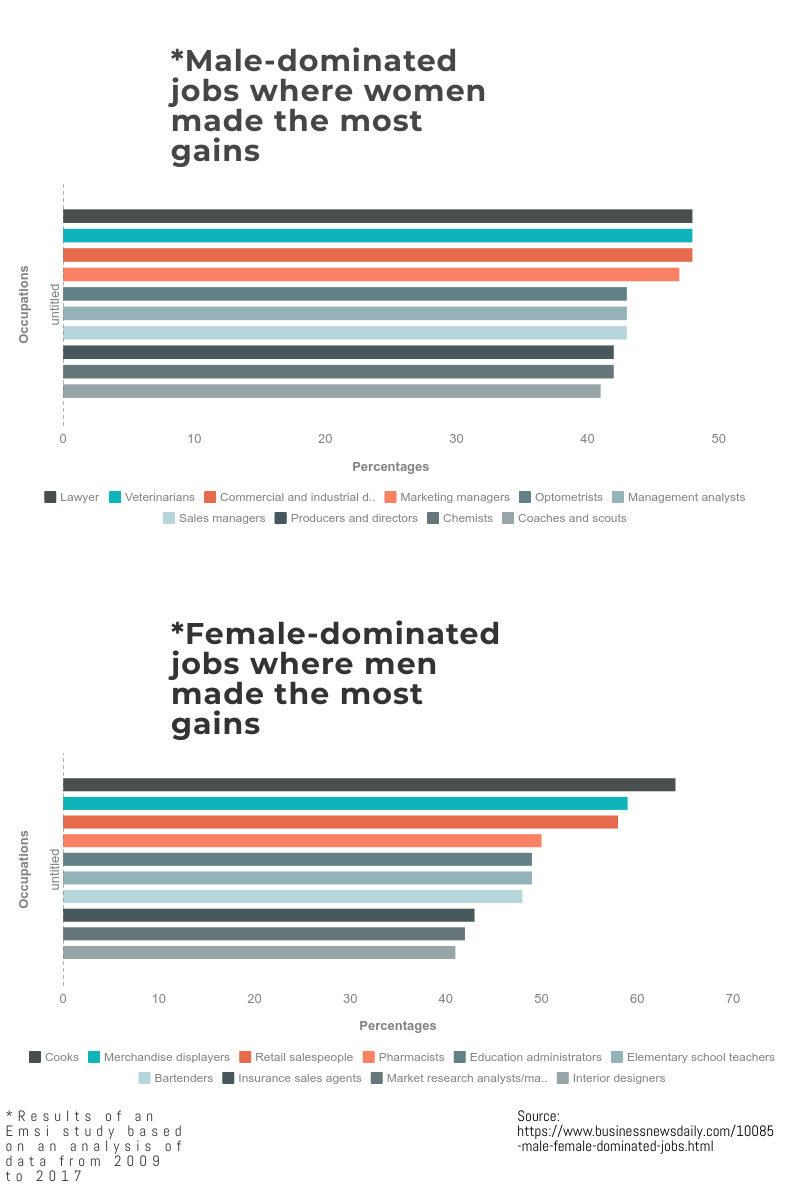Diversity rises, but gender stigmas remain
Jaime Torres practices taking pulse and blood pressure. The Liberal nursing major chose to ignore the masculinity stigma of male nurses by focussing on his passion for caregiving.
December 3, 2019
When jobs are gender biased, men and women are limited to the occupational options specific to their sex. But the gender lines are beginning to blur.
The Civil Rights Act of 1964 prohibits employers from discriminating against applicants and employees on the basis of race, color, religion, sex and national origin. Many still unconsciously assign a gender to a specific job such as nurse to woman, police officer to man, teacher to woman and mechanic to man.
Male-dominated fields typically have higher pay, better benefits, and more respect; all strong reasons for females to break the gender barrier. But what about men?
Andrew Cherlin, a sociologist and public policy professor at Johns Hopkins University, says traditional views of masculinity are part of why males are avoiding “female” jobs.
However, at Seward County Community College, that is not the case. Jaime Torres Jr, a sophomore nursing major from Los Angeles, California, doesn’t let the masculinity stigma stop him from pursuing his passion for caregiving.
“Even though many patients have made comments about having a male nurse, I don’t feel the stigma. I don’t let it stop me from caring for people,” Torres says.
Similar to Torres overcoming the masculinity stigma, women must overcome challenges to even get a job, but tend to deal with unfair workplaces.
About 19% of women say their gender has made it harder for them to succeed at their job. Caitlin Gilmore, a Liberal High School concurrent student, in the automotive program, agrees.
“It is definitely hard being the only girl. I’m not as strong and it takes me longer to do some things,” Gilmore says.
Besides physical difficulties due to her gender, Gilmore says the expectations are higher for girls. Gilmore adds that most guys can just get a community college education and find a job easily, but she would have to go to a respectable school or people would think she didn’t know anything.
“I do what my teacher says, and I do it correctly. But when the guys slack off, and are passing, I’m somehow failing,” Gilmore adds.
Though succeeding in gender bias jobs can be difficult, many women and men do not regret their career choice and encourage others to do the same. Gilmore encourages girls to put in more effort to prove themselves.
“To all other girls, try to not act high and mighty because you’re the only girl. Be friends with the guys. Also, try your hardest. Do it on your own. Don’t give in to their assistance, unless it’s absolutely necessary,” Gilmore says.
Torres believes anyone should pursue a career if they are passionate about it.
“Don’t just go into a job for security. Have a purpose to do it or else you probably won’t do it correctly,” Torres says.
Torres adds that gender diversity in the workforce will only improve if people educate the younger generation. People need to teach children to not view women as weak or inferior. Bias comes from parents and the people around them.
“We need people to say ‘I don’t want to hear this anymore,’ and change,” Torres says.















![The sophomores were recognized on the field instead of walking across the stage during their doubleheader. They received their diplomas and a picture of themselves playing during their career at Seward. [Pictured left to right are Dylan Day, Reed Thomas, Jase Schneider, Mason Martinez, Gannon Hardin, Brody Boisvert, and Zach Walker]](https://crusadernews.com/wp-content/uploads/2022/05/WEBDSC_0275-900x454.jpg)



































































Todd Carter • Dec 4, 2019 at 3:44 pm
Great article and well researched.